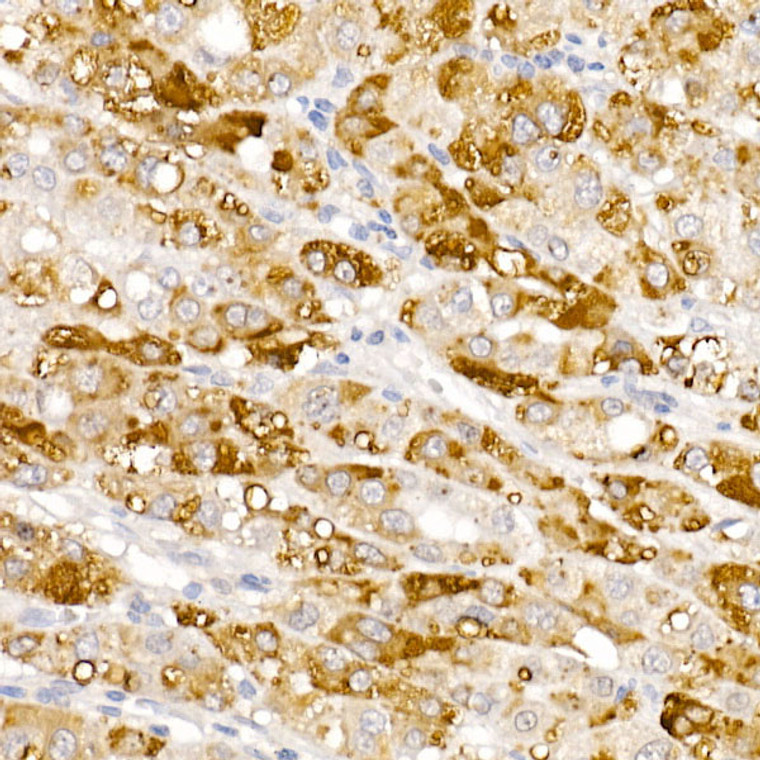| Host: |
Rabbit |
| Applications: |
WB/IHC-P/IF/ICC/ELISA |
| Reactivity: |
Human/Mouse/Rat |
| Note: |
STRICTLY FOR FURTHER SCIENTIFIC RESEARCH USE ONLY (RUO). MUST NOT TO BE USED IN DIAGNOSTIC OR THERAPEUTIC APPLICATIONS. |
| Clonality: |
Polyclonal |
| Conjugation: |
Unconjugated |
| Isotype: |
IgG |
| Formulation: |
PBS with 0.05% Proclin300, 50% Glycerol, pH 7.3. |
| Purification: |
Affinity purification |
| Concentration: |
Lot specific |
| Dilution Range: |
WB:1:500-1:1000IHC-P:1:50-1:200IF/ICC:1:50-1:200ELISA:Recommended starting concentration is 1 Mu g/mL. Please optimize the concentration based on your specific assay requirements. |
| Storage Instruction: |
Store at-20°C for up to 1 year from the date of receipt, and avoid repeat freeze-thaw cycles. |
| Gene Symbol: |
HSD17B13 |
| Gene ID: |
345275 |
| Uniprot ID: |
DHB13_HUMAN |
| Immunogen Region: |
30-211 |
| Specificity: |
Recombinant fusion protein containing a sequence corresponding to amino acids 30-211 of human HSD17B13 (NP_835236.2). |
| Immunogen Sequence: |
RRKSVAGEIVLITGAGHGIG RQTTYEFAKRQSILVLWDIN KRGVEETAAECRKLGVTAHA YVVDCSNREEIYRSLNQVKK EVGDVTIVVNNAGTVYPADL LSTKDEEITKTFEVNILGHF WITKALLPSMMERNHGHIVT VASVCGHEGIPYLIPYCSSK FAAVGFHRGLTSELQALGKT GI |
| Tissue Specificity | Highly expressed in the liver. Also detected in ovary, bone marrow, kidney, brain, lung, skeletal muscle, bladder and testis. |
| Function | Plays a pivotal role in hepatic lipid metabolism. In vitro, it catalyzes the oxidation of a variety of lipid substrates, including 17beta-estradiol, retinol, retinal, and leukotriene B4. Isoform 2: Has retinol/retinal dehydrogenase activity in vitro. Isoform 1: Does not have retinol/retinal dehydrogenase activity in vitro. |
| Protein Name | 17-Beta-Hydroxysteroid Dehydrogenase 1317-Beta-Hsd 13Hepatic Retinol/Retinal DehydrogenaseShort Chain Dehydrogenase/Reductase Family 16c Member 3Short-Chain Dehydrogenase/Reductase 9 |
| Database Links | Reactome: R-HSA-8964572 |
| Cellular Localisation | Isoform 2: Lipid DropletEndoplasmic ReticulumRedistributed From The Endoplasmic Reticulum To Lipids Droplets In The Cell Upon Induction Of Lipids Droplet FormationIsoform 1: CytoplasmDoes Not Localize To Lipid Droplets |
| Alternative Antibody Names | Anti-17-Beta-Hydroxysteroid Dehydrogenase 13 antibodyAnti-17-Beta-Hsd 13 antibodyAnti-Hepatic Retinol/Retinal Dehydrogenase antibodyAnti-Short Chain Dehydrogenase/Reductase Family 16c Member 3 antibodyAnti-Short-Chain Dehydrogenase/Reductase 9 antibodyAnti-HSD17B13 antibodyAnti-SCDR9 antibodyAnti-SDR16C3 antibodyAnti-HMFN0376 antibodyAnti-UNQ497 antibodyAnti-PRO1014 antibody |
Information sourced from Uniprot.org
12 months for antibodies. 6 months for ELISA Kits. Please see website T&Cs for further guidance












